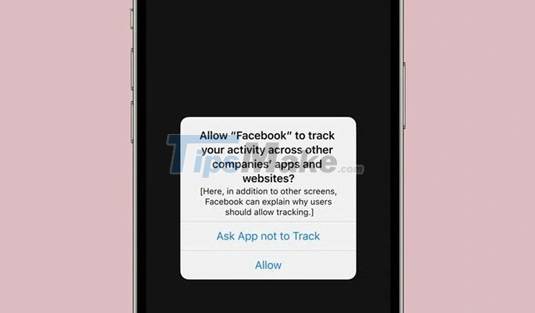iOS 14.5 is rocking the advertising industry
User's choice
After updating iOS 14.5, when opening the app, the device will ask "Do you want to let the app track". There are two options: "Allow 'or" Require an application not to track ".

Most users will choose no when faced with this obvious question regardless of the reason for the developer's data collection.
What do apps track users?
Previously, apps on iOS were allowed to collect and share a set of data. The collected user's information includes phone number, email address (encrypted), location, which apps are on the phone, when it was used. This data set is assigned with a number called an advertiser identification number (IDFA).
The longer a user uses the iPhone and uses multiple apps, the more traces of data left behind. Through IDFA codes, apps can use that data to create a virtual set of user profiles, which in turn better directs ads to them.
But with iOS 14.5, to access data associated with IDFA every application must ask for user permission. If the user does not allow it, the application will not be able to retrieve the data associated with their IDFA.
What does this feature impact the user?
Don't allow apps to crawl, but users will still see display ads. But due to the inability to access your virtual profile, the ads inside the app will be less accurate, not targeting the needs of the user as before. This will affect the entire digital advertising industry, as well as an important source of revenue for many free apps.
This is certainly not good news for the advertising industry, with $ 350 billion in annual revenue. Many developers, most notably Facebook, have openly opposed Apple. Building a demand-oriented, virtual profile is a very important feature of Facebook's advertising revenue, helping them generate $ 80 billion per year. Facebook even accused Apple of using its advantages to limit the form of data collection of competitors, prioritizing for itself.
Contrary to Facebook, Google is quite calm. Google owns ecosystems with many different services and can collect data from its applications, so it has decided not to use IDFA to drive ads.
Although you do not agree to provide IDFA but still use Google services such as Search, Maps, Chrome or Gmail, you will still be crawled.
What benefits Apple?
In recent times, Apple has always been on the issue of protecting user data. However, according to the Financial Times, Apple can still benefit from being limited to advertisers.
Developers will have a greater incentive to roll out paid apps when they can't make as much money from ads. Apple charges 15-30% for all revenue generated through the App Store platform, so when many applications no longer operate under the "free, sell ads" model, the company still benefits.
The change in iOS 14.5 doesn't immediately affect Android users. However, to catch up with Apple Google may also have to change. That means the entire advertising industry has to fix its approach after iOS 14.5's release.